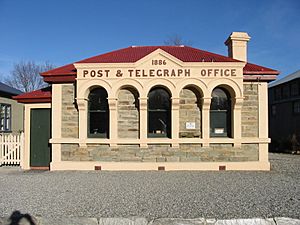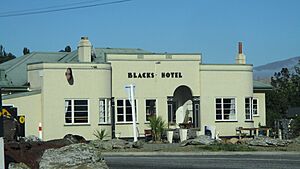Ophir, New Zealand facts for kids
Quick facts for kids
Ophir
|
|
|---|---|
|
Rural locality
|
|

Ophir Post and Telegraph Office
|
|
| Country | New Zealand |
| Region | Otago |
| Territorial authority | Central Otago District |
| Ward | Vincent Ward |
| Time zone | UTC+12 (NZST) |
| • Summer (DST) | UTC+13 (NZDT) |
| Local iwi | Ngāi Tahu |
Ophir is a small town in Central Otago, New Zealand. It is located between the towns of Alexandra and Ranfurly. You can find it near the east bank of the Manuherikia River. The town of Omakau is just across the river, about 3 kilometers away.
Ophir was first known as Blacks. This was because gold was found in Central Otago in 1863. When gold was discovered, many people moved to the area. Ophir's population grew to over 1,000 people. It became a busy center for business and social life. The town was then renamed Ophir. This name comes from a place where King Solomon got gold for his temple. It is like the legendary "King Solomon's Goldmines."
In 1906, the Otago Central Railway was built. The train line went through Omakau, not Ophir. This helped Omakau grow and become more important. But it caused Ophir to lose many of its residents.
Today, Ophir has about 50 people living there. The town is special because many of its old buildings are still standing. These include the old Post and Telegraph Office, the 1895 Courthouse, and the 1870s Police Station. The Post Office is made of schist and stone. It was built in 1886 and is a very important historic place.
Ophir also holds a New Zealand record. On July 3, 1995, the country's second-lowest temperature was recorded here. It was a very cold -21.6 °C! This is surprising because Ophir is not in a high mountain area.
Ophir's Population and Community
Statistics New Zealand considers Ophir to be part of the Omakau rural settlement. This larger area is called the Manuherikia-Ida Valleys statistical area.
Ophir's Weather and Climate
| Climate data for Ophir, elevation 305 m (1,001 ft), (1991–2020 normals, extremes 1924–present) | |||||||||||||
|---|---|---|---|---|---|---|---|---|---|---|---|---|---|
| Month | Jan | Feb | Mar | Apr | May | Jun | Jul | Aug | Sep | Oct | Nov | Dec | Year |
| Record high °C (°F) | 35.2 (95.4) |
35.1 (95.2) |
31.6 (88.9) |
26.8 (80.2) |
24.5 (76.1) |
20.3 (68.5) |
18.0 (64.4) |
22.3 (72.1) |
25.4 (77.7) |
27.7 (81.9) |
31.0 (87.8) |
34.4 (93.9) |
35.2 (95.4) |
| Mean maximum °C (°F) | 30.6 (87.1) |
30.1 (86.2) |
27.7 (81.9) |
23.3 (73.9) |
19.8 (67.6) |
16.2 (61.2) |
15.3 (59.5) |
17.4 (63.3) |
20.7 (69.3) |
23.9 (75.0) |
26.4 (79.5) |
28.8 (83.8) |
31.8 (89.2) |
| Mean daily maximum °C (°F) | 23.6 (74.5) |
23.5 (74.3) |
21.0 (69.8) |
16.8 (62.2) |
12.8 (55.0) |
8.5 (47.3) |
8.1 (46.6) |
11.4 (52.5) |
14.8 (58.6) |
17.1 (62.8) |
19.3 (66.7) |
21.8 (71.2) |
16.6 (61.8) |
| Daily mean °C (°F) | 15.8 (60.4) |
15.4 (59.7) |
12.9 (55.2) |
9.2 (48.6) |
6.2 (43.2) |
2.8 (37.0) |
2.1 (35.8) |
4.6 (40.3) |
7.5 (45.5) |
9.7 (49.5) |
11.8 (53.2) |
14.4 (57.9) |
9.4 (48.9) |
| Mean daily minimum °C (°F) | 8.1 (46.6) |
7.4 (45.3) |
4.8 (40.6) |
1.7 (35.1) |
−0.3 (31.5) |
−2.9 (26.8) |
−3.8 (25.2) |
−2.2 (28.0) |
0.2 (32.4) |
2.2 (36.0) |
4.3 (39.7) |
7.1 (44.8) |
2.2 (36.0) |
| Mean minimum °C (°F) | 0.4 (32.7) |
0.4 (32.7) |
−2.1 (28.2) |
−5.0 (23.0) |
−6.9 (19.6) |
−8.7 (16.3) |
−9.0 (15.8) |
−7.6 (18.3) |
−5.9 (21.4) |
−4.4 (24.1) |
−2.7 (27.1) |
0.0 (32.0) |
−9.8 (14.4) |
| Record low °C (°F) | −2.6 (27.3) |
−2.1 (28.2) |
−5.6 (21.9) |
−8.0 (17.6) |
−14.5 (5.9) |
−16.5 (2.3) |
−21.6 (−6.9) |
−12.8 (9.0) |
−10.6 (12.9) |
−6.9 (19.6) |
−5.7 (21.7) |
−4.1 (24.6) |
−21.6 (−6.9) |
| Average rainfall mm (inches) | 47.8 (1.88) |
42.3 (1.67) |
32.7 (1.29) |
35.7 (1.41) |
37.8 (1.49) |
33.7 (1.33) |
19.1 (0.75) |
17.5 (0.69) |
21.1 (0.83) |
36.1 (1.42) |
41.4 (1.63) |
48.5 (1.91) |
413.7 (16.3) |
| Source: NIWA | |||||||||||||
See also
 In Spanish: Ophir (Nueva Zelanda) para niños
In Spanish: Ophir (Nueva Zelanda) para niños
 | William M. Jackson |
 | Juan E. Gilbert |
 | Neil deGrasse Tyson |


